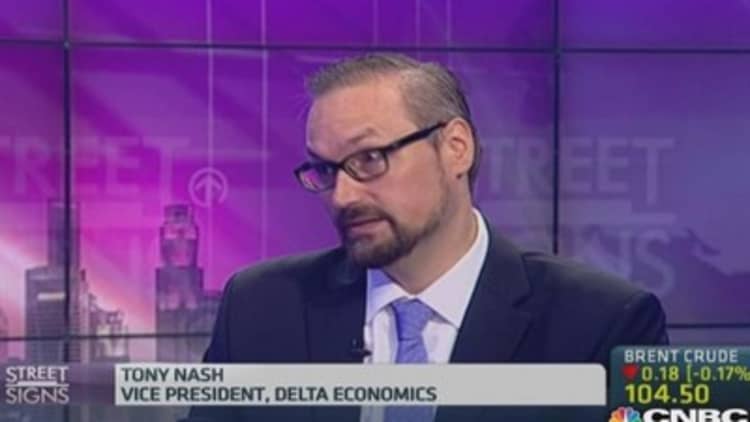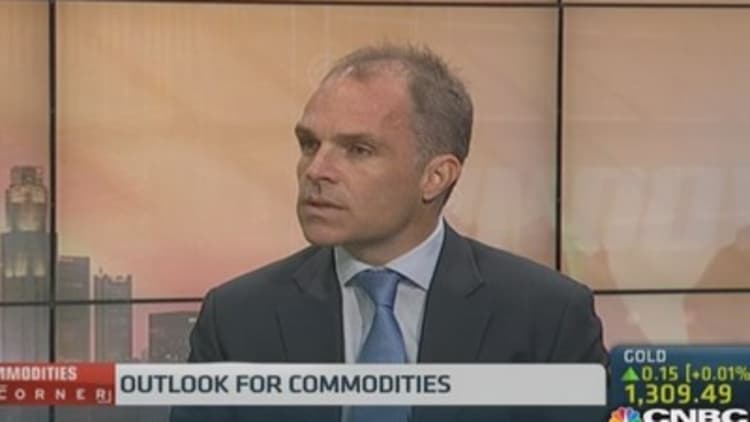Total retail sales in July likely took a hit from falling gasoline prices, but those lower prices at the pump are likely to give consumers more spending power for back-to-school shopping in August.
Markets will be on the watch for Wednesday's key retail sales report, released at 8:30 a.m., since it will be a clear read on the consumer, responsible for driving nearly 70 percent of the economy. Another important report comes at 10:30 a.m. when the energy market gets weekly government data on oil and gasoline inventories.
Economists expect retail sales to rise 0.2 percent and up 0.3 percent for the control group, excluding gasoline, autos and building materials.

"The number should be decent because the job market is good," said Joseph LaVorgna, chief U.S. economist at Deutsche Bank. "...it's going to be a decent quarter."
Read MoreThis will 'pull the rug out' from market: LaVorgna
Barclays chief U.S. economist Dean Maki said he expects July retail sales to be flattish because of the drop in gasoline prices and lower pace of auto sales, but he expects the core to be up 0.3 percent. Maki said consumer spending should be up 2.5 percent in the second quarter, the same as first quarter.
Gasoline prices have been falling since peaking at $3.685 per gallon June 29, after oil prices were pushed higher on fears about Iraq. But Iraq has not seen a disruption in supply and oil prices have fallen—with West Texas Intermediate trading at just above $97 per barrel Tuesday.
"The price is $0.15 lower than July," said Tom Kloza, analyst with GasBuddy. "It's been a downtrend since (June). We're at about $3.46 per gallon at the moment." Kloza says this is the lowest gasoline price for this time of year since 2010, and he expects to see it to end the year at $3.30, after it bottoms in November.
Falling gasoline prices should filter through to August retail sales, and it may show up as a positive. "This is going to give a boost to spending power in August that is unusually large," said Maki, noting the price change is not as significant in July. "The recent drop in gasoline prices will give a boost to consumer's disposable income as we're heading into the back-to-school season."

Earnings this week from major retailers should also provide a fresh, close up look at consumers as back-to-school shopping gets underway. Macy's reports Wednesday morning, and others, like Nordstrom and Wal-Mart report later in the week. According to Thomson Reuters, Macy's same- store sales were expected to rise 4 percent in the second quarter and earnings are expected at $0.86 per share.
"What I would say is consumer spending is a critical part of the moderate recovery. Consumer spending isn't as strong as it was in prior cycles, and that's part of the reason why overall real GDP growth is not as strong either," Maki said. "But on the other hand, it is a key reason why the economy continues to grow at a pace fast enough to increase employment and keep the unemployment rate falling. One could look at it from either perspective."
Read MoreGeopolitics posing 'uneasy comfort' for oil markets
While geopolitics have rocked markets lately, oil has diverged. It rose on initial news of Sunni radicals capturing territory in Iraq, but has since fallen off on the view that the world is well supplied. Clashes between the radical group ISIS and Kurdish forces continued in Iraq. Iran Tuesday as well as Iraq's most powerful Shiite militia endorsed Iraq's new prime minister designate Haider al-Abadi. The endorsement dealt a blow to Nouri al-Maliki, who has been struggling to hold onto power and vowing to fight Abadi's formation of a new government.
Yet oil fell Monday after the International Energy Agency said while the situation in several producing countries is riskier than ever, supplies are ample and there is a glut building in the Atlantic basin. Brent was at a 13-month low and U.S. West Texas Intermediate fell $0.71 to $97.37 per barrel. As a result, energy was the worst performing S&P industry sector, down 0.7 percent Tuesday.
"I was kind of surprised that the IEA about global demand brought the sellers out of the woodwork. There seems to be a consensus that the fundamentals are weak. There's a lot of African and North Sea oil trying to find a home," said Gene McGillian, analyst with Tradition Energy. "Nobody's worried even though it seems that things are escalating in Iraq. Nobody seems to care."

The Energy Information Administration is expected to report Wednesday a drop of 2 million barrels in crude oil stocks in the last week, according to Platts.
"I'm looking for a build in crude, and I know the market's looking for another draw," said McGillian. "We've had five weeks in a row of draw down and I think we're going to start seeing refinery rates coming down and that's going to stop this draw in crude we've seen. As far as demand goes, we think we're going to see gasoline stocks draw down and that's going to be the result of people trying to push supply through to retailers to meet demand for Labor Day."
Besides Iraq, markets are especially focused on Ukraine. Stocks were slightly lower Tuesday as traders eyed a Russian convoy moving toward eastern Ukraine, under the auspices of humanitarian aid. While there were concerns that Russia was planning to reinforce militia, Ukraine worked out an agreement that Russia could deliver the contents of approximately 200 trucks to the Red Cross. The Dow was down 9 points at 16,560, and the was off 3 points at 1,933. Volume was the fourth lightest of the year.
Read More
"The volume continues light," said Art Cashin, director of floor operations at UBS. "We're beginning to get some data coming in (Wednesday), but it's all going to be about Europe. What's going to happen when that Russian convoy crosses the border."
Besides Macy's, earnings are expected from Deere in the morning as well as Canadian Solar, Pinnacle Foods and SeaWorld. Cisco, NetApp, Iamgold, Silver Wheaton and Noodles and Co report after the closing bell.
Business inventories data is reported at 10 a.m. Markets will be monitoring comments from New York Fed President William Dudley at 9:05 a.m. and Boston Fed President Eric Rosengren at 9:20 a.m. They are speaking at a conference on the risks of wholesale funding.
—By CNBC's Patti Domm


